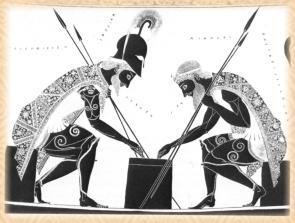
The Current State of Greece
We resume our story six years, in the year 425 BCE, after the events of last season. While the world has not changed drastically in that time, the war has paused. With Cleon’s attempt to seize power from Pericles thwarted, Athens retained their defensive strategies. Through these strategies that kept them from going out further into the world, a plague that was prophesied to ravage the city was avoided, though many on the streets say it was the mercies of the gods that protected them.
Regardless, events of the war carried on as each side began escalating their hostilities pushed on by both Brasidas and Cleon. Eventually, in a span of a year, the Spartans suffered two devastating defeats in Pylos and Sphacteria, while Athens suffered the same in Boeotia and Amphipolis. The casualties in Amphipolis included both Brasidas and Cleon, who were the primary warmongers over the past year. With the heavy casualties and the loss of Sparta’s leading general and one of Athens’ most popular politicians, both sides were exhausted and ready for peace.
The negotiations were started by Pleistoanax, King of Sparta, and Nicias, an Athenian general. Nearly everything was to return to the prewar state of things. Both sides released their prisoners, sending them home. Temples throughout Greece would be open to worshipers from all cities, and the oracle at Delphi regained their autonomy. Athens would continue to collect tribute from the states from which it had received it, but Athens could not force them to become allies. Athens in turn agreed to come to Sparta's aid if the helots revolted.
It is in the weeks following this tenuous truce, known as the Peace of Nicias, that we begin our second season of Pantheon.


